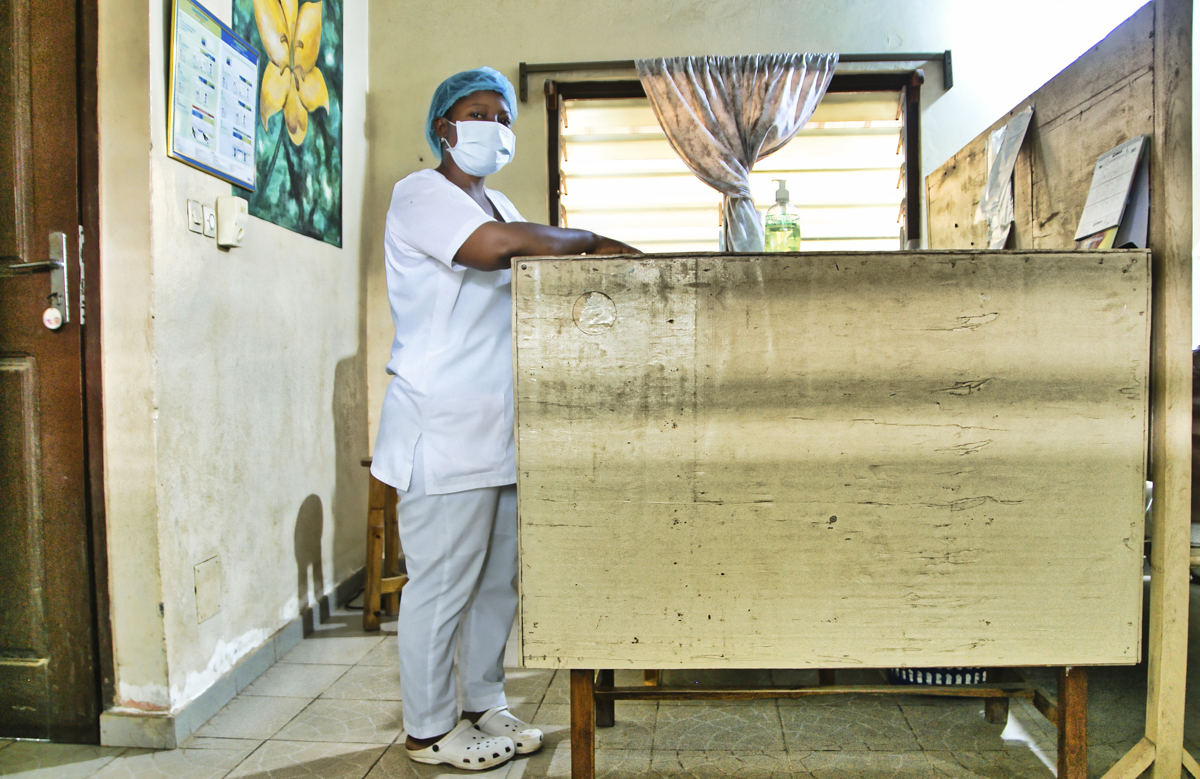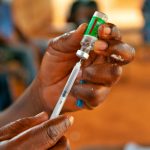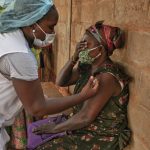STORY AND PHOTOS BY AJ JOHNSON
ENGLISH TRANSLATION BY KRISTEN VONNOH
[Article below in English.]
Covid-19, entre corruption et angoisse
J’ai récemment voyagé au Bénin, un des pays voisins, dans le cadre de mon travail. Avant de partir je me suis assuré de faire un test Covid qui s’est avéré négatif. Pour ce voyage j’avais décidé de prendre la voie terrestre puisque, de sources sûres, quoiqu’officiellement les frontières terrestres étaient fermées, il était assez bien possible de traverser la frontière sans aucun problème—à condition de payer des frais, non déclarés, aux différents postes de contrôles que ce soit du côté du Togo, mon pays de départ, que du pays d’arrivée.
À l’un des postes de contrôle frontalier, un agent en blouse blanche s’est approché de notre voiture, avec un appareil de contrôle de température à la main, mais quelle ne fut notre surprise de le voir, tout simplement prendre les sous que le chauffeur lui tendait discrètement. À la suite, il est reparti aussi simplement et rapidement. Sans aucun contrôle !
Ainsi mon test Covid n’avait été utile que pour me rassurer moi-même et mon équipe qu’en partant pour ce voyage, j’étais bien portant, du moins je n’avais pas la Covid-19.
Alors que la mission se poursuivait, après une sortie pour déjeuner, je commençais à sentir des picotements dans ma gorge. En tant que chrétien, mon premier réflexe a été de prier et de “chasser” ce mal de gorge qui pointait. Quelques instants après, les picotements se sont arrêtés.
Mais le lendemain ils étaient de retour. J’ai commencé à prendre plus de thé chaud que d’habitude et ce, jusqu’à mon retour à Lomé.
Néanmoins non seulement les picotements se sont un peu plus accentués, mais j’avais commencé à tousser. Par conséquent, je commençais à avoir des doutes : de façon insidieuse, l’idée que ce soit la Covid-19, commençait à vouloir se tailler une bonne place dans ma tête.
J’ai commencé alors à ne pas trop m’approcher de ma femme et de nos enfants, à mettre le masque. Ne voulant pas effrayer mon épouse, j’ai justifié ces mesures en lui disant tout simplement que comme je toussais, je ne voulais pas les contaminer avec ma toux.
Je commençais aussi à me sentir un peu plus fatigué et à ressentir des courbatures dans mon corps et surtout dans les articulations. Je me rendis alors chez mon médecin pour une consultation, et après lui avoir listé les différents symptômes, notamment les courbatures, je le sentis prendre légèrement un peu de recul avant de me prescrire un test de dépistage de la Covid-19. En plus il me prescrivit, ainsi qu’à mon épouse, de l’Azicure 500, qui selon lui, était aussi le médicament utilisé par le protocole de traitement appliqué au Togo pour les malades de la Covid-19.
Je suis rentré en m’efforçant d’être le plus positif et stoïque possible. Je n’ai rien dit à mon épouse mais je m’assurais de garder une bonne distance et je ne permettais pas à nos enfants de trop s’approcher de moi.
Je fus très troublé quand ma femme commença à se plaindre de vifs maux de têtes. Je lui remis alors l’Azicure, en lui assurant que c’était un médicament qui pouvait l’aider à calmer ces douleurs.
Le lendemain matin je suis allé faire le test, puis j’ai attendu les résultats.
Les dispositions prises au Togo pour les résultats du test Covid sont les suivantes : si vous êtes négatif au test, ils ne vous rappellent pas. Mais si vous êtes positif, ils vous rappellent et prennent des mesures soit d’auto-confinement et de traitement, soit de transfert au centre de prise en charge des malades de la Covid pour un suivi et un traitement d’appoint.
Les résultats seraient disponibles dans l’après-midi du lendemain. Quand le moment arriva, je consultais mon téléphone tout le temps même si je ne recevais aucune notification d’appel. Je me suis assuré de garder mon portable bien chargé, allumé et disposant bien du réseau.
J’ai attendu, attendu, et attendu : aucun appel ! Ni le lendemain, ni deux semaines après.
Le verdict était donc clair : test négatif. Ce n’était donc pas la Covid-19 ! Mes symptômes étaient sans doute liés à d’autres facteurs : une réaction allergique au jus de gingembre que j’ai bu à Cotonou, la fatigue du voyage, une inflammation de la gorge due à la poussière ou aux moisissures microscopiques présentes dans notre chambre, ou une grippe, tout simplement.
Quand je suis retourné voir mon docteur, et que je lui ai dit que je n’avais pas été rappelé, il sourit et me dit : “ce n’est donc pas positif parce qu’ils [le service des tests Covid] ne laissent rien passer si c’est positif”.
Depuis, tous les symptômes ont disparu. Et je me suis rappelé que j’avais eu une expérience similaire lorsque j’étais rentré de mon voyage en RDC quelques mois auparavant. Angoisse quand tu nous tiens !
Il est très probable que beaucoup de gens du monde ont connu de tels moments d’angoisses depuis le début de cette crise sanitaire. Les céphalées, les crises de grippes et courbatures que nous avions auparavant, et qui ne nous effrayaient pas outre mesure, sont devenues des sources d’angoisse, de peur profonde aujourd’hui à cause de la Covid-19, n’importe où que l’on habite.
Heureusement il y a les tests qui nous permettent de faire la part des choses : en ce sens, nos gouvernements font bien de mettre en place un système de dépistage volontaire gratuit dans nos différentes communes.
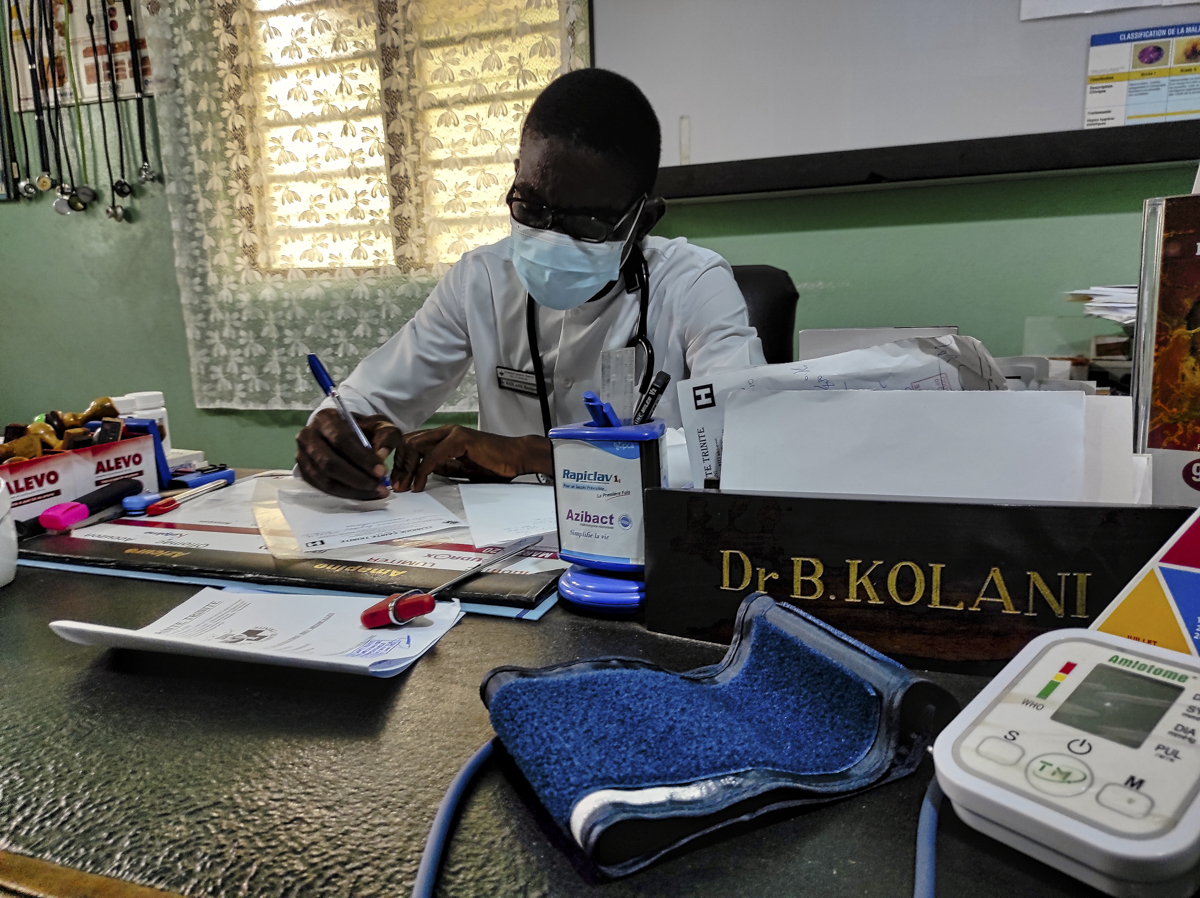
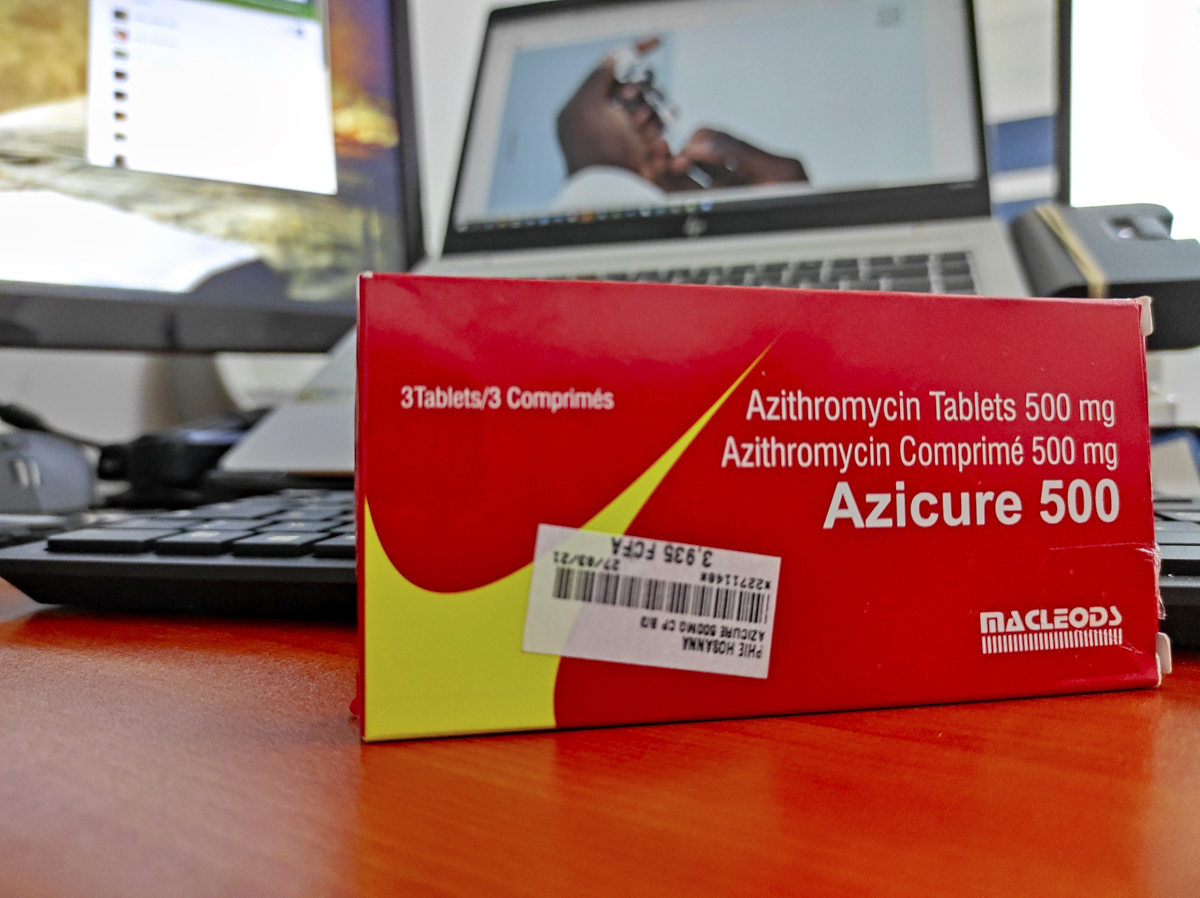
COVID-19, Between Corruption and Anguish
I recently traveled to the neighboring country of Benin for my work. Before leaving, I made sure to take a COVID-19 test, which was negative. I decided to take the land route for this trip since reliable sources informed me that although land borders were officially closed, it was quite possible to cross the border without any problem, provided I paid undeclared fees at the various checkpoints on the Togo side, my country of departure, as well as on the Benin side.
At one of the border checkpoints, an agent in a white coat approached our car with a temperature measuring device in his hand, but we were shocked when the driver discreetly slipped him some cash. The agent left just as casually and quickly as he had approached. Without checking us at all!
So my COVID-19 test was really only useful to reassure myself and my team that when I left on this trip, I was healthy, or at least that I didn’t have COVID-19.
As the mission continued, after a lunch outing, I began to feel a tingling in my throat. As a Christian, my first instinct was to pray and “chase away” the sore throat that was coming on. A few moments later, the tingling stopped. However, the next day it was back again, and I started to drink more hot tea than usual until I returned to Lomé, Togo’s capital.
Not only did the tingling continue to get a little worse, but I actually started coughing. As a result, I started to have doubts. The persistent idea that it was COVID-19 was starting to take over my thoughts. I started to stay away from my wife and our children and began wearing a mask. As a justification and since I didn’t want to scare my wife, I simply told her that since I was coughing, I didn’t want to contaminate them with my cough.
I also started to feel tired and achy, especially in my joints, so I went to my doctor for a consultation. After hearing my list of symptoms and especially when I mentioned the aches and pains, I sensed him physically back up a little, as if distancing himself from me, before prescribing a COVID-19 test. In addition, he prescribed Azicure 500 for my wife and me, which according to him is the drug used in the treatment protocol applied in Togo for COVID-19 patients.
I went home trying to be as positive and stoic as possible. I didn’t say anything to my wife, but I made sure to keep a safe distance and didn’t allow our children to get too close to me. I was very disturbed when my wife began to complain of a severe headache. I gave her the Azicure, assuring her that it was a medicine that could help her with the pain.
The next morning, I went to be tested and to begin my wait for the results.
In Togo, if you test negative for COVID-19, they don’t call you back. But if you test positive, they call you and institute measures for self-isolation and treatment, or for transferring you to the COVID-19 patient care center for monitoring and additional treatment.
Results would be available by the afternoon of the next day. When the time came, I checked my phone constantly even though I wasn’t getting any call notifications. I made sure to keep the phone charged, turned on, and in an area with good service. I waited and waited and waited: no calls! Not even the next day or two weeks later.
The verdict was clear: negative test! So it wasn’t COVID-19 but probably an allergic reaction to the ginger juice I had drunk in Cotonou, the fatigue of the trip, an inflammation of the throat due to the dust or microscopic mold in our room, or simply a flu. When I went back to my doctor and told him I hadn’t received any follow-up call after the test, he smiled and said, “So it’s not positive, because they don’t let anything pass if it’s positive!”
Since then, all my symptoms have disappeared. And I remembered that the same thing happened when I came back from my trip to the Democratic Republic of Congo a few months ago. O anxiety, how you can have a hold on us.
It’s likely that many people in the world have experienced similar moments of fear and anxiety since the beginning of this health crisis. Headaches, colds, and aches that didn’t used to scare us have become sources of anxiety and deep fear because of COVID-19, no matter where we live. Fortunately, there are tests that allow us to determine the difference: In this sense, our governments have done well to set up a system of free screening in our various communities.

